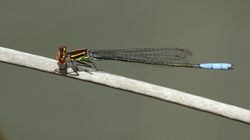Biology:Pseudagrion newtoni
| Harlequin sprite | |
|---|---|

| |
| Male | |
| Scientific classification | |
| Domain: | Eukaryota |
| Kingdom: | Animalia |
| Phylum: | Arthropoda |
| Class: | Insecta |
| Order: | Odonata |
| Suborder: | Zygoptera |
| Family: | Coenagrionidae |
| Genus: | Pseudagrion |
| Species: | P. newtoni
|
| Binomial name | |
| Pseudagrion newtoni Pinhey, 1962
| |
Pseudagrion newtoni, the harlequin sprite, is a species of damselfly in the family Coenagrionidae.
Distribution
This sprite is endemic to South Africa , where it is rare and localised in KwaZulu-Natal and Mpumalanga.[1]
Habitat
Grass-lined or sedge-lined streams in hilly or mountainous country.[2] Much of this riparian habitat has been transformed by cropping, trampling by livestock and invasion by shrubs and trees. The harlequin sprite is, therefore, no longer found in much of its former range, and its survival is threatened.[1]
Description
Mature male: The face is bright orange, and the top of the head is black with bright orange postocular spots joined by a line of the same colour. The eyes are reddish-brown above and yellow-brown below. The upper thorax is black with orange antehumeral stripes and the sides are green to blue. The abdomen is black above, except for S7 to S10, which are bright blue above. The wings are clear with reddish-brown pterostigmata.[3]
Identification
This species is similar to Pseudagrion hageni, but Pseudagrion newtoni is smaller, and S7 is black in P. hageni. Pseudagrion newtoni also has a diagnostic bright blue heart-shaped marking on S10. Preferred habitats are also different: Pseudagrion newtoni is found in grasslands rather than wooded country.[3]
References
- ↑ 1.0 1.1 1.2 Samways, M.J. (2010). "Pseudagrion newtoni". IUCN Red List of Threatened Species 2010: e.T42843A10758888. doi:10.2305/IUCN.UK.2010-3.RLTS.T42843A10758888.en. https://www.iucnredlist.org/species/42843/10758888. Retrieved 17 November 2021.
- ↑ Tarboton, W.R.; Tarboton, M. (2015). A guide to the dragonflies and damselflies of South Africa. Cape Town: Struik Nature. ISBN 9781775841845.
- ↑ 3.0 3.1 Samways, Michael J. (2008). Dragonflies and damselflies of South Africa (1st ed.). Sofia: Pensoft. ISBN 978-954-642-330-6.
External links
Wikidata ☰ Q1309189 entry
 |







